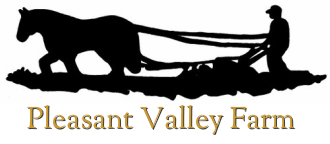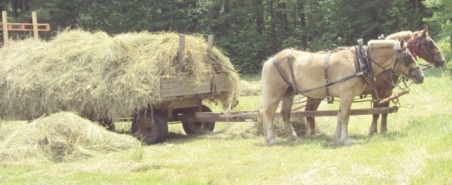WHY WORK HORSES?
In this modern day, most businesses and people strive to have the newest, most up-to date technology. We find that the most frequently asked questions about our farm revolve around why we use antique equipment and labor-intensive methods. The most obvious example of this is our decision to use draft horses instead of farm tractors. It is not because we are Amish or Mennonite, nor was anyone in our family a former member of either of these religious communities. While we do have Amish neighbors and respect their way of life, they use horses because of their religous objection to modern technology. We could buy a tractor tomorrow, but choose not to.
So the question is ...why work horses??
So the question is ...why work horses??
Self Sufficiency
Oil is not an unlimited resource; it's also not one produced by the average farm, even here in the Pennsylvania oil fields. Tractors burn diesel fuel and emit exhaust fumes. On our farm, we try to be as self sufficient as possible, so while we can't grow diesel, we can grow hay and corn to power our horses. Exhaust fumes are a pollutant, and as far as we are aware, no one has yet found a way to recycle them for a productive use. Our horses' byproduct is manure. While not the prettiest thing on a farm, manure is one of the most important. It completes a natural cycle that our farm depends on. When manure is composted or spread directly on the larger fields, it enriches the soil and makes a more fertile environment for our plants to grow, which in turn helps feed the animals. Without manure, we would be dependant on chemical additives to enrich the soil. These chemicals do help plants grow; that is why so many farms use them. However, these chemicals are largely petroleum-based, and more of them are necessary each year to reach the same amount of crop production. Our organic methods and philosophy favor building the soil up the way nature intended.
Soil compactation
While this is not an issue many non-farmers have heard much about, it's a concept many people can relate to. Have you ever noticed a field or yard that has places grass won't grow because cars have used it as a driveway? Even after the last car drives away, it takes a very long time for plants to take root again. This is because the weight of the vehicles compresses the soil leaving no space for roots to grow. A large farm tractor can weigh 6 tons or more, not including the weight of the machinery being pulled behind it. As it drives across the field, it compresses the soil. While it dosen't kill the plants, over the years the plants will have to put more effort into sending their roots through the compacted soil, which means less effort can be directed into making the fruit of the plant- corn, wheat, tomatoes, potatoes, etc. While our Belgains weigh nearly a ton each, their hooves and the machinery they pull do not have the same compacting effect on the soil. In exceptionally wet springs, like that of 2011, our horses are able to get out in the fields without damaging the soil long before conventional farmers can use their tractors.
Heritage
These methods, this equipment, are part of America's rural & farming heritage. Most people know John Deere makes tractors, but don't know they originally went into business to make farm equipment that was pulled with a team of horses. Teams of horses built America. The machines we use are examples of the technology of our past, some that we still use are 100+ years old. They still work today, in an era where it's hard to make a new car last more than a decade or two. To put your hands on one, and to use it as it was intended lets you physically touch the past and feel the pride & craftsmanship that were a part of those times.
Oil is not an unlimited resource; it's also not one produced by the average farm, even here in the Pennsylvania oil fields. Tractors burn diesel fuel and emit exhaust fumes. On our farm, we try to be as self sufficient as possible, so while we can't grow diesel, we can grow hay and corn to power our horses. Exhaust fumes are a pollutant, and as far as we are aware, no one has yet found a way to recycle them for a productive use. Our horses' byproduct is manure. While not the prettiest thing on a farm, manure is one of the most important. It completes a natural cycle that our farm depends on. When manure is composted or spread directly on the larger fields, it enriches the soil and makes a more fertile environment for our plants to grow, which in turn helps feed the animals. Without manure, we would be dependant on chemical additives to enrich the soil. These chemicals do help plants grow; that is why so many farms use them. However, these chemicals are largely petroleum-based, and more of them are necessary each year to reach the same amount of crop production. Our organic methods and philosophy favor building the soil up the way nature intended.
Soil compactation
While this is not an issue many non-farmers have heard much about, it's a concept many people can relate to. Have you ever noticed a field or yard that has places grass won't grow because cars have used it as a driveway? Even after the last car drives away, it takes a very long time for plants to take root again. This is because the weight of the vehicles compresses the soil leaving no space for roots to grow. A large farm tractor can weigh 6 tons or more, not including the weight of the machinery being pulled behind it. As it drives across the field, it compresses the soil. While it dosen't kill the plants, over the years the plants will have to put more effort into sending their roots through the compacted soil, which means less effort can be directed into making the fruit of the plant- corn, wheat, tomatoes, potatoes, etc. While our Belgains weigh nearly a ton each, their hooves and the machinery they pull do not have the same compacting effect on the soil. In exceptionally wet springs, like that of 2011, our horses are able to get out in the fields without damaging the soil long before conventional farmers can use their tractors.
Heritage
These methods, this equipment, are part of America's rural & farming heritage. Most people know John Deere makes tractors, but don't know they originally went into business to make farm equipment that was pulled with a team of horses. Teams of horses built America. The machines we use are examples of the technology of our past, some that we still use are 100+ years old. They still work today, in an era where it's hard to make a new car last more than a decade or two. To put your hands on one, and to use it as it was intended lets you physically touch the past and feel the pride & craftsmanship that were a part of those times.
Sustainability
Whether you use a tractor or a horse, nothing lasts forever, and eventually you will need a new one. A new farm tractor can cost tens of thousands of dollars, which is a huge debt for any family farm to take on. If you need a new horse and have the ability to plan ahead, you can raise one yourself. A mare, or female horse, is pregnant for almost a year. She can do light to medium work safely even late into the pregnancy, taking off only perhaps the last month. A young horse can begin light work and training at 2-3 years of age. A well-trained horse or team you raise but don't need can be another source of income for the farm, too. The Stevenson family founded Pleasant Valley Farm in 1990, and among the livestock they brought with them was a Belgain mare named Amanda. She lived to be about 36 years old, and was able to work in the fields and raise foals until the last few years of her life. Today, twenty years later, we have only one team of Belgains, but our mare Dixie is Amanda's daughter. Our other work horse, Dolly, is Dixie's daughter and Amanda's granddaughter.
Whether you use a tractor or a horse, nothing lasts forever, and eventually you will need a new one. A new farm tractor can cost tens of thousands of dollars, which is a huge debt for any family farm to take on. If you need a new horse and have the ability to plan ahead, you can raise one yourself. A mare, or female horse, is pregnant for almost a year. She can do light to medium work safely even late into the pregnancy, taking off only perhaps the last month. A young horse can begin light work and training at 2-3 years of age. A well-trained horse or team you raise but don't need can be another source of income for the farm, too. The Stevenson family founded Pleasant Valley Farm in 1990, and among the livestock they brought with them was a Belgain mare named Amanda. She lived to be about 36 years old, and was able to work in the fields and raise foals until the last few years of her life. Today, twenty years later, we have only one team of Belgains, but our mare Dixie is Amanda's daughter. Our other work horse, Dolly, is Dixie's daughter and Amanda's granddaughter.
|
Love
Anything can be work if you don't enjoy it; a job can be a pleasure if you love what you're doing. We love our horses. While it is true that they can be stubborn, unpredictable or just have a bad day, we can overlook that because most of the time they are willing partners in working the land. We all have bad days but a well-trained horse's good days will be far more numerous. While a tractor can be parked in a shed and left without a thought over the winter, horses require you to interact with them daily, 365 days a year. It is this constant relationship which enables you to work as a team, for not only do they rely on you for food and water, shelter and pasture, but in turn you rely on them for innumerable tasks throughout the year as well. We also love our farm, and find that farming with horses connects you to the soil in a way that is far more meaningful to us; it gives you a connection to the place and the moment that we feel are too often lost from the seat of a modern tractor. |
On a bright spring day, it can be a very pleasant experience to work the land with the horses; there is no roar of engines to drown out the first birdsongs of the year. The gentle chiming of the harnesses and rhythmic noise of the machinery leaves plenty of space for quiet thought. Yes, it is hard work, and sore muscles are just as common for the drivers as they are the horses. You are not sheltered from sun, wind or rain in a climate-controlled cab. But we wouldn't have it any other way.
I will leave the final word to the famed writer Wendall Berry. His poem, simply titled "Horses", says it all.
I will leave the final word to the famed writer Wendall Berry. His poem, simply titled "Horses", says it all.


